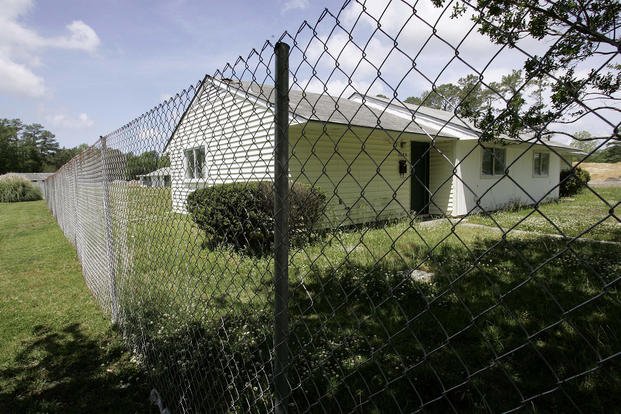Marines and sailors who unwittingly drank and showered in water containing organic solvents and other volatile compounds at Camp Lejeune, North Carolina, during its water contamination crisis decades ago had a 70% higher risk of developing Parkinson's disease, according to newly published research.
A study published Monday in the Journal of the American Medical Association Neurology suggests the chemicals that poisoned the base water supply more than 40 years ago contribute to the fatal illness, which affects the nervous system and can cause tremors, slurred speech and difficulty moving.
The research compared the health records of more than 172,000 personnel assigned to Camp Lejeune from 1975 to 1985 with those of nearly 170,000 at Camp Pendleton, California, who were not exposed to contaminated water. The data showed 279 service members assigned to Camp Lejeune had a diagnosis of Parkinson's or had Parkinson-like symptoms, compared with 151 at Pendleton.
Read Next: Army Pilots Are Flying Way Less, as Fatal Incidents Pile Up
Crunching the numbers, the researchers found that the risk of Parkinson's was significantly higher in Camp Lejeune veterans and diagnoses of anxiety, tremor or erectile dysfunction -- Parkinsonism symptoms -- also were higher in those at the East Coast base.
The findings have implications not only for the roughly 1 million service members who were assigned to the base from 1953 to 1987 but also for their family members, civilian Defense Department employees and millions worldwide who were exposed to a common contaminant, trichloroethylene, or TCE, and tetrachloroethylene, or PCE, a dry-cleaning solvent.
"The study's findings suggest that the risk of Parkinson's disease is higher in persons exposed to TCE and other [volatile organic compounds] in water four decades ago," wrote the researchers, led by Dr. Samuel Goldman, a professor of medicine at the University of California, San Francisco Medical School and a staff physician at the San Francisco VA Medical Center. "Millions worldwide have been and continue to be exposed to this ubiquitous environmental contaminant."
Marine Corps and Navy personnel, their families and DoD civilians who lived on or worked at the base from 1953 to 1987 were exposed to industrial solvents such as trichloroethylene and tetrachloroethylene and other volatile organic compounds that leached into the drinking water supply at Camp Lejeune. The contamination was the result of illegal dumping by on-base personnel and an off-base dry cleaning company; leaking underground storage tanks; and spills.
For years, the government failed to disclose the extent of the contamination and denied that it was widespread. Following years of pressure from service members, their families and the media, however, the federal government in 2017 extended Department of Veterans Affairs disability benefits to affected veterans, as well as health care to families suffering a number of health conditions.
Illnesses seen in those assigned to the installation, as well as the nearby Marine Corps Air Station New River, included fertility issues and stillbirths; leukemia; bladder, liver and kidney cancers; multiple myeloma; non-Hodgkin's lymphoma; and Parkinson's.
Since 2017, Parkinson's has been considered a presumptive condition for those who served at Camp Lejeune for at least 30 days, from Aug. 1, 1953, to Dec. 31, 1987. The designation means that disability claims filed by affected veterans are fast-tracked through the processing system, as is health care.
Historically, however, the VA has failed to adequately process Camp Lejeune claims. A 2022 VA Office of Inspector General's investigation found that, of the more 57,000 claims that were filed under the new ruling, the VA mishandled nearly 40% of those claims, denying or delaying benefits to more than 21,000 affected veterans.
The PACT Act, which became law in August, allowed victims of the contamination to sue the federal government for injuries related to exposure at Camp Lejeune. Under the law, they must file an administrative claim with the Navy first, and if the service doesn't adjudicate a decision within six months, they may sue for civil damages in federal court in North Carolina.
The new law sparked a salvo of advertising from attorneys seeking to represent former service members or their families with filing their claims, often at exorbitant legal fees. GOP lawmakers have called for capping the fees to ensure that veterans receive more of their settlement money should they win their cases.
A previous small study determined that exposure to TCE was associated with a six-times greater risk of developing Parkinson's disease. Goldman, who conducted those earlier studies, had sought to conduct larger-scale research to affirm the link, but the funding remained unavailable for nearly 10 years before the VA finally provided it, he said.
"I felt a personal responsibility because this multibillion-dollar assumption was based on that little twin study," explained Goldman in an article accompanying the research. "The human data were so limited to make that impactful a declaration."
Given how common TCE is in water, millions potentially have been exposed worldwide and risk developing Parkinson's.
Those who lived at Camp Lejeune and New River during the specified 40-year time frame are at risk as well.
In a JAMA news article accompanying the study, Briana De Miranda, an assistant professor of neurology and of pharmacology and toxicology, said the recent research was "very strong," designed to examine the effects of specific solvents on those exposed.
"I suspect there is probably more Parkinson's disease, and I think there's a lot more to come," said De Miranda, who was not involved in the study.
VA officials said that Camp Lejeune veterans and their families are eligible for health care and may be eligible for disability compensation. They can find out more about their options here.
-- Patricia Kime can be reached at Patricia.Kime@Military.com.
Related: VA Agent Orange Benefits Would Expand Under Landmark Burn Pit Bill














